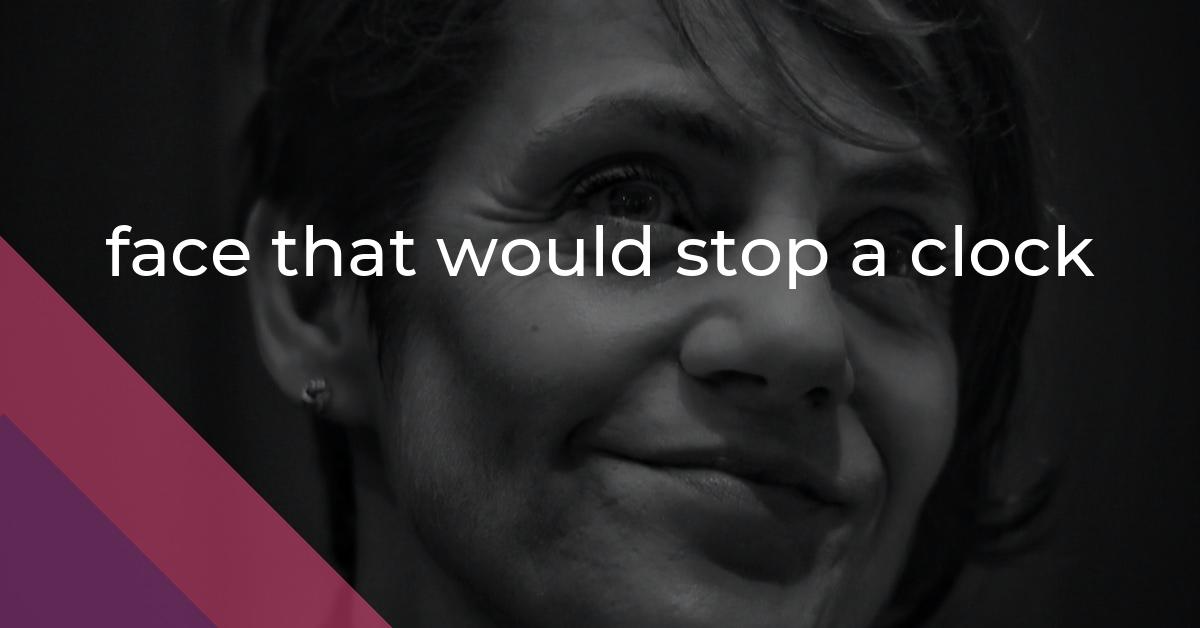face that would stop a clock: Idiom Meaning and Origin
What does ‘face that would stop a clock’ mean?
An idiom meaning an extraordinarily unattractive face, to the point where it metaphorically stops a clock.

Idiom Explorer
The idiom "not a pretty sight" means that something or someone is unattractive or unpleasant to look at.
An idiom meaning someone has an extremely unattractive or unpleasant face, often used to give a brutally honest description of someone's appearance.
The idiom "go nowhere fast" means to make no progress or achieve no results despite putting in a lot of effort or time.
The idiom "frown at" means to display disapproval or express dislike towards someone or something through a facial expression of wrinkling or lowering one's brow.
An idiom used to express frustration, shock, or annoyance, often in an exasperated or pleading tone.
An idiom that means to go against or defy something, often in a defiant or bold manner.
An idiom meaning someone is not very intelligent or mentally unstable.
The idiom "face down" means to confront or deal with a difficult situation or challenge directly and without hesitation.
The idiom "down for the count" means to be too tired or defeated to continue or to be knocked unconscious, often used in sports or boxing. It suggests being incapacitated and unable to recover quickly.
The idiom "dough-faced" refers to a person with a pale, expressionless face, resembling uncooked dough. It is used to describe someone who lacks vitality or emotion in their facial expression.
Unmasking Facial Expressions
The idiom "face that would stop a clock" is often used to describe an exceptionally unattractive or shocking appearance. It suggests that the sight of such a face would be so jarring or distressing that it would halt the movement of even a clock. Although its definitive origins are unknown, the idiom has become an intriguing part of the English language, capturing attention and sparking curiosity.
One related idiom is "have a face like the back end of a bus." This idiom is used to describe a face that is extremely unattractive or unpleasant to look at. It conveys an image of a face that is so unappealing that it resembles the back end of a bus, which is often dirty and unsightly. The use of this idiom emphasizes the extreme unattractiveness of someone's face.
Another related idiom is "butter face," which is a playful way of describing a person who has an attractive body but an unattractive face. The idiom plays on the phrase "but her face," suggesting that everything about the person is attractive except for their face. This idiom is often used humorously to draw attention to the contrast between a person's body and their face.
The idiom "not a pretty sight" is used to describe something or someone that is visually unappealing or unpleasant to look at. It conveys the idea that the sight of the object or person is not pleasing or attractive. This idiom can be used to describe a wide range of things, from physical appearances to situations or events that are difficult or unpleasant to witness.
Lastly, the idiom "beat with the ugly stick" is used to describe someone who is extremely unattractive. It suggests that the person's appearance is so unappealing that it is as if they have been physically beaten with a stick that makes them ugly. This idiom uses vivid imagery to emphasize the extreme unattractiveness of someone's appearance.
The origins of these idioms may be unclear, but their usage and interpretation offer valuable insights into the dynamism of the English language. They add color and amusement to communication, providing a way to convey extreme unattractiveness or shocking appearances in a concise and memorable manner.
The idiom "face that would stop a clock" and its related idioms, such as "have a face like the back end of a bus," "butter face," "not a pretty sight," and "beat with the ugly stick," offer colorful ways to describe unattractive or shocking appearances. These idioms use vivid imagery and concise language to convey the extreme unattractiveness of someone's face or appearance in a memorable and often humorous manner. Although their origins may be uncertain, these idioms continue to be frequently used in contemporary communication, adding flair and amusement to the English language.
Example usage
Examples of how the idiom "face that would stop a clock" can be used in a sentence:
- Her beauty was so stunning, it was like a face that would stop a clock.
- When he entered the room, everyone turned their heads because he had a face that would stop a clock.
- The model's face was so captivating, it could stop a clock with its beauty.
An analysis of the idiom "face that would stop a clock":
The idiom "face that would stop a clock" is used to describe someone or something with such exceptional beauty or attractiveness that it visibly captures attention or stops people in their tracks. The phrase implies that the person's face is so stunning that it would command people's full attention, causing them to lose track of time. It emphasizes the remarkable visual impact of the person's appearance.
More "Humor" idioms



